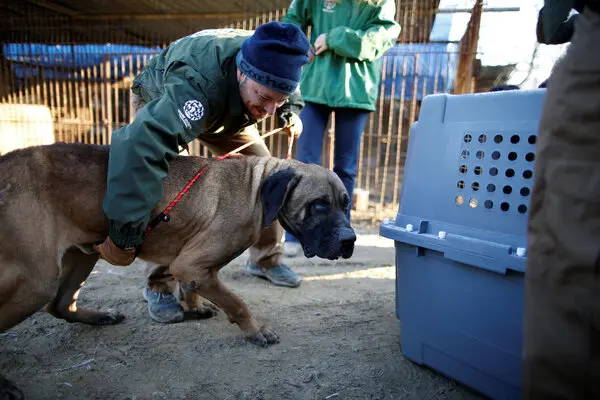In a historic shift driven by growing compassion and changing public values, South Korea has officially passed a law banning the dog meat industry. The ban, passed by the National Assembly in January 2024, prohibits the breeding, slaughter, sale, and distribution of dogs for human consumption. It will take full effect in 2027, after a three-year grace period.
But what becomes of the hundreds of thousands of dogs currently being raised for meat? Here’s a look at what’s changing — and what’s next for the animals, farmers, and the nation.

What the Law Says
Under the new legislation:
- Breeding, butchering, and selling dogs for meat will be criminalized
- Violators face up to 3 years in prison or fines of up to ₩30 million (~US$23,000)
- The law does not criminalize eating dog meat, but eliminates the supply chain that made it possible
- A three-year transition period (until 2027) is provided for businesses to adapt
This law applies to:
- Around 1,100 dog farms
- About 1,600 restaurants
- Dozens of slaughterhouses and dog meat distributors
What Will Happen to the Dogs?
1. Closure of Farms and Facilities
By 2027, all dog farms and slaughterhouses must be shut down. The dogs in these facilities will either be rehomed, sent to animal shelters, or, in unfortunate cases, euthanized if no alternatives exist.
2. Rescue and Rehoming Efforts
Animal welfare groups — such as Humane Society International, Korean K9 Rescue, and Animal Welfare Awareness, Research and Education (AWARE) — are working with local authorities to:
- Rescue dogs from farms
- Provide medical care and rehabilitation
- Arrange international adoptions, particularly to the U.S., Canada, and Europe
Some dogs have already found homes abroad, aided by celebrities like actor Daniel Henney, who supports rescue efforts.
3. Government Compensation Plan
The South Korean government is offering financial assistance to dog meat farmers and related businesses:
- ₩225,000 to ₩600,000 (~US$170–$450) per dog as compensation
- Support for transitioning to other industries, such as crop farming or pet-related services
- Low-interest loans and training programs
However, some farmers argue the compensation is too low and have called for legal challenges, claiming their livelihoods are being unfairly disrupted.
Why This Matters
Changing Public Sentiment
Dog meat consumption has declined sharply:
- Only 8% of South Koreans ate dog meat in the past year (Gallup Korea, 2022)
- Over 64% now oppose the practice — up from just 27% in 2015
- 93% say they do not intend to eat dog meat in the future
As pet ownership soars and younger generations grow more animal-conscious, the cultural tide has turned.
Government Support
The bill had rare bipartisan support, and President Yoon Suk-yeol, along with First Lady Kim Keon-hee (both dog lovers), openly backed the legislation.
What Activists and Critics Are Saying
Animal rights activists are calling this a historic victory. They hope it will inspire other countries where dog meat is still consumed to follow suit.
On the other hand, dog meat farmers and vendors feel targeted and economically displaced. Some have formed unions and vowed to resist the law, even hinting at constitutional appeals.

What Comes Next?
With the law in place and the clock ticking toward 2027, the priority is clear:
- Safely rehome or rehabilitate remaining dogs
- Support workers and businesses affected by the transition
- Educate the public to avoid illegal underground markets
The success of this ban depends not just on legislation, but on coordinated action, funding, and compassion from both the government and civil society.
A Global Message
South Korea’s dog meat ban sends a powerful message to the world: cultural traditions can evolve, and animal welfare can triumph through peaceful democratic action. With this decision, South Korea joins a growing list of countries moving away from this controversial practice — and sets a hopeful example for others to follow.
– Deeprows News



